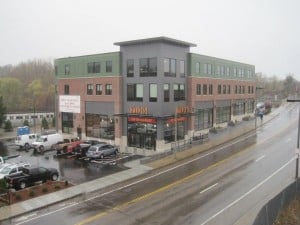
Rockland Trust provided a $4 million NMTC loan to the Commonwealth Landing development in Fall River.
With passage of House Republicans’ tax reform bill last week, repeal of the less-discussed new markets tax credit is another step closer to fruition.
Such a move would wipe out a stream of financing that has played a vital role in economic development projects in lower income communities across the state, including New Bedford, Lawrence and Brockton.
“The good the credit has done has been extraordinary,” said Elyse Cherry, president and CEO of Boston Community Capital, a community development financial institution that has been awarded tax credit allocations on numerous occasions. “The new markets tax credit has been a really efficient way to encourage investment in low income and rural communities. … I think it’s clear that lots of these undertakings wouldn’t happen without it.”
Established by Congress in 2000, the NMTC program has made an outsized impact on communities across the country and in Massachusetts.
According to the New Markets Tax Credit Coalition, between 2003 and 2015, $42 billion in direct NMTC investments were made in businesses, which leveraged nearly $80 billion in total capital investment in communities with high rates of poverty and unemployment. Between 2003 and 2012, the NMTC generated about 750,000 jobs, at a cost to the federal government of less than $20,000 per job.
In Massachusetts, there were $1.82 billion in NMTC investments between 2003 and 2014, which leveraged another $884 million from other funding sources. That funding created more than 16,000 construction jobs, more than 15,000 full-time equivalent jobs, 350 community facilities and 84 mixed-use redevelopment projects.
Playing Politics
Like the rest of the proposed tax reform, the bill sits in a web of legislation. The reform bill passed the House last Thursday, but the credit was preserved in the Senate’s version of the bill, a win for NMTC advocates.
However, the Senate’s version of the bill faces far greater odds after lawmakers included a controversial provision to repeal the Affordable Care Act’s requirement that most Americans have insurance, in an effort to free up revenue to offset tax cuts.

Rockland Trust provided $5.9 million in construction financing for the Arboretum Place development in Jamaica Plain that was converted to a permanent mortgage through Rockland Trust’s New Markets Tax Credit program.
The bill is already facing opposition as Sen. Ron Wyden (R-Wisconsin) said Wednesday he could not vote for the bill, making the margin for error in the Senate narrower.
“With regard to the credit, we have strong support with both parties, so we have our work cut out for us to be sure, but we are optimistic we can win this,” said Bob Rapoza, a Fall River native and founder and president of Rapoza Assoc.
Rapoza Assoc., a public interest lobbying firm in Washington D.C., helped found the NMTC Coalition in 1998.
“The Senate bill does not have the repeal and we expect when it comes out of committee, the credit will be intact and we think we can win the argument on floor,” he said.
But Rapoza hopes lawmakers can do more than just preserving the credit; his ideal scenario is to see them extend the credit, which is set to expire in 2019.
“That would be best thing. A longer timeframe gives more certainty to organizations with the credits to build capacity with investors to understand the credit,” he said. “When Congress extended it in 2015, pricing on the credit improved because people thought there was a longer-term commitment to the credit from the federal government.”
Replacement Unlikely
Although tax reform would lower the corporate tax rate significantly, potentially freeing up capital for investment, advocates and those who work at community development entities do not see any replacement for the funding that derives from the NMTC.
“Whatever the benefits of tax reform, there are still going to be poor communities that lack access to capital,” said Rapoza, adding that NMTC investments have built health care facilities in Lawrence, Holyoke and Boston.
Michael Savage, vice president and coordinator of the NMTC program and SBA lending at Rockland Trust, said some of the recipients of the funds would have to fill the hole with fundraising, which would take years and years for these types of projects.
“If the program eventually goes away, low income community projects will not get done, at least not on a timely basis,” he said.
Rockland has received NMTC allocations totaling $191 million since 2003, resulting in the bank’s community development entities making about $218 million in NMTC loans, the creation or retention of approximately 4,952 jobs and the acquisition and redevelopment of approximately 3.9 million square feet of real estate.
Rockland, which has its own entities and is the sole investor in those entities, has used the funds to transform a cotton mill in Fall River into a multi-use development project, and for financing of the Arboretum Place development in Jamaica Plain.
Rockland’s NMTC projects have also helped the bank reach its Community Reinvestment Act goals.
The other factor to consider, said Cherry of Boston Community Capital, is that as much as the NMTC might take away tax revenue, it also generates tax revenue with jobs and businesses that accumulate income taxes, and facilities that pay property taxes.
“In the end, it pays for itself by increased economic activity,” she said. “This is one of those workhorse things that makes the economy run.”






